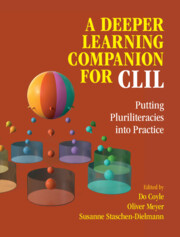Book contents
- A Deeper Learning Companion for CLIL
- A Deeper Learning Companion for CLIL
- Copyright page
- Contents
- Tables
- Figures
- Contributors
- Preface
- Part I Key Ideas and Principles of Pluriliteracies Teaching for Deeper Learning
- Part II Deeper Learning Episodes: First Steps towards Transforming Classrooms
- 5 Chemistry: Exploring Pluriliteracies through a Deeper Learning Episode on Redox Reactions
- 6 Physics: Exploring Pluriliteracies through a Deeper Learning Episode on Rainbows
- 7 Geography: Exploring Pluriliteracies through a Deeper Learning Episode on Global Warming
- 8 History: Exploring Pluriliteracies through a Deeper Learning Episode on the German Empire
- 9 Political Science: Exploring Pluriliteracies through a Deeper Learning Episode on Electronic Waste
- 10 Modern Languages: Exploring Pluriliteracies through a Deeper Learning Episode in French Literature with Younger Beginner Learners
- 11 Religious Education: Exploring Pluriliteracies through a Deeper Learning Episode on Modern-Day Prophets
- 12 Music: Exploring Pluriliteracies through a Deeper Learning Episode on ‘The Wellerman’
- 13 Deeper Learning Mathematics
- References
8 - History: Exploring Pluriliteracies through a Deeper Learning Episode on the German Empire
from Part II - Deeper Learning Episodes: First Steps towards Transforming Classrooms
Published online by Cambridge University Press: 04 February 2023
- A Deeper Learning Companion for CLIL
- A Deeper Learning Companion for CLIL
- Copyright page
- Contents
- Tables
- Figures
- Contributors
- Preface
- Part I Key Ideas and Principles of Pluriliteracies Teaching for Deeper Learning
- Part II Deeper Learning Episodes: First Steps towards Transforming Classrooms
- 5 Chemistry: Exploring Pluriliteracies through a Deeper Learning Episode on Redox Reactions
- 6 Physics: Exploring Pluriliteracies through a Deeper Learning Episode on Rainbows
- 7 Geography: Exploring Pluriliteracies through a Deeper Learning Episode on Global Warming
- 8 History: Exploring Pluriliteracies through a Deeper Learning Episode on the German Empire
- 9 Political Science: Exploring Pluriliteracies through a Deeper Learning Episode on Electronic Waste
- 10 Modern Languages: Exploring Pluriliteracies through a Deeper Learning Episode in French Literature with Younger Beginner Learners
- 11 Religious Education: Exploring Pluriliteracies through a Deeper Learning Episode on Modern-Day Prophets
- 12 Music: Exploring Pluriliteracies through a Deeper Learning Episode on ‘The Wellerman’
- 13 Deeper Learning Mathematics
- References
Summary
Susanne Staschen-Dielmann’s history episode is designed to offer learners deep understanding and command of a specific historical genre. Criteria-centred evaluation is one of the most challenging text types to master in history. It requires the ability to analyse and evaluate historical events from different perspectives in a nuanced way through a set of criteria. A series of tasks leads to students creating instructional videos for other students. In those videos, students explore aspects of society in the German Empire guided by the research question: ‘After unifying the German Reich with “blood and iron” in 1871, did Bismarck manage to unify German society as a nation?’ After sharing their findings on different social and political factions and analysing similarities and differences according to social, political, economic and ideological positions, learners collaboratively assess the degree of national unity or disunity in Germany under Bismarck, following the principles of criteria-centred evaluation.
Keywords
Information
- Type
- Chapter
- Information
- A Deeper Learning Companion for CLILPutting Pluriliteracies into Practice, pp. 125 - 149Publisher: Cambridge University PressPrint publication year: 2023
